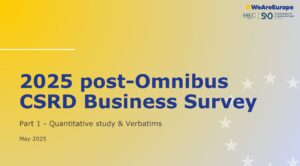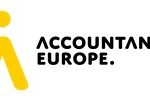
A survey of over 1,000 European companies reveals that companies are not as keen on weakening sustainability legislation as policymakers think. Conducted by #WeAreEurope — an apolitical collective of European professionals who carry the voice of businesses and citizens — in partnership with leading academic institutions such as HEC Paris, LMU Munich and CBS Copenhagen, the survey is the first to ask a large sample of companies of all sizes about shortcomings and advantages of CSRD. The results show that a majority of businesses view the CSRD as aligned with their strategic priorities and Europe’s broader vision of corporate responsibility — while expressing significant concerns about the direction of the Commission’s simplification efforts.
The results challenge the political narrative underpinning the Omnibus package – a package framed as addressing business and competitiveness concerns. When presenting the Omnibus simplification package, Ursula von der Leyen proudly stated “This will make life easier for our businesses”. This came off the back of companies such as TotalEnergies and Siemens lashing out at the CSRD for hindering competitiveness.
Alexis Kryceve, President of #WeAreEurope, said: “Not all companies have the resources or the power to lobby in Brussels. This survey shows that the narrative of the most vocal and critical businesses far from reflects the views of a majority of companies. Most of them are extremely supportive of a European economic model and leadership embracing sustainability. We hope policymakers will take these findings into account so we end up with an Omnibus package that is balanced and in line with Europe’s sustainability goals”.
Broad-based endorsement of corporate sustainability reporting, even among smaller firms and across countries
61% of companies report being satisfied or very satisfied with the CSRD in its current form. Only 7% say it needs fundamental revision. Support holds even among traditionally sceptical financial departments, where dissatisfaction stands at just 27%.
The legislation is widely seen as strengthening companies’ risk management, ESG strategy and impact assessment. 88% of respondents say the CSRD reflects Europe’s economic, environmental and social vision for business. Remarkably, 62% view it as positively contributing to Europe’s sovereignty and influence.
Even among smaller firms — often presented as suffering from a disproportionate burden — support is high. For firms with 250-500 employees, 57% are supportive, rising to 67% among companies with more than 5,000 staff.
Geographical differences were smaller than expected: Despite political calls for reform in Germany and France, only a minority of companies in those countries express dissatisfaction with the CSRD — 21% in Germany and just 16% in France.
An anonymous representative of a French financial intermediation company said in the survey:
“The CSRD is a tool that promotes business resilience. It enables companies to gain a clear picture of their resilience for 2030 or 2050 and to anticipate and act today to ensure their survival tomorrow.”
Companies do not feel at a global disadvantage due to sustainability reporting
Just 25% of businesses are satisfied with the Commission’s Omnibus proposal, which aims to simplify corporate sustainability and due diligence rules. Over half (51%) are not satisfied with it.
Companies largely reject the idea that CSRD places them at a global competitive disadvantage — only 37% agree with this, while 46% directly disagree.
Instead, they point to a lack of guidance as the main issue. The most supported suggestion for improvement (86%) is reducing the number of required data points and improving automation.
Smaller companies want to stay in scope
The European Commission has been championing the Omnibus package as supporting small businesses by proposing a change which would mean that only companies with more than 1,000 employees would have to report – up from 250.
The survey suggests this proposal is going too far. While 49% of companies support raising the CSRD reporting threshold from 250 to 500 employees, only 27% favour moving it to 1,000.
Among firms in the 500–1,000 employee range, 56% want to stay within scope of mandatory reporting.
Alexis Kryceve, President of #WeAreEurope, said: “We suspected that there was more support for the existing rules than policymakers knew, but still these results have surprised us. European companies aren’t calling for weaker rules — they want clarity, proportionality, and implementation support to reach their objectives. But they don’t consider these standards a threat to their competitiveness towards the US or China. On the contrary, most European companies see sustainability as an essential for their future success.”



